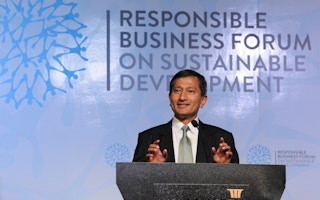Natural disasters such as Typhoon Haiyan which struck the Phillipines earlier this month, killing thousands and displacing millions “are not enough to change public and political opinion on what needs to be done”, Singapore’s Minister for Environment and Water Resources Vivian Balakrishnan said on Monday.
To continue reading, subscribe to Eco‑Business.
There's something for everyone. We offer a range of subscription plans.
- Access our stories and receive our Insights Weekly newsletter with the free EB Member plan.
- Unlock unlimited access to our content and archive with EB Circle.
- Publish your content with EB Premium.
Giving the opening keynote at the Responsible Business Forum on Sustainable Development at the Marina Bay Sands Expo Convention Centre, Dr Balakrishnan said he was pessimistic that the world will come up with a “comprehensive agreement that will do enough to resolve the problem”.
These were his first comments after returning from the recently-concluded United Nations climate talks in Warsaw where governments across the world met to discuss a global treaty to address climate change.
“It’s very tragic that even after like Typhoon Haiyan and Hurricane Sandy… the political metre has not shifted,” he told the 500-strong audience of business and government leaders.
“I’m not sure at what point the disasters at a global level will be so severe, that public and political opinion will change fundamentally.”
He also noted that the issue of ‘fairness’ is dogging the climate talks, where countries are “bickering like children” about who was at fault and who should pay for it.
“Unfortunately, these arguments about fairness are going to bog us down so much that we probably will spend all our time arguing about fairness and not enough time to do what is necessary.”
Not mincing his words, he said that the talks have resulted in institutions such as a green climate fund and a ‘loss and damage’ mechanisms, but “all of these are empty shells”.
“Unless in the next two years we can make tough hard real decisions, the deadlines, the funds, will just remain negotiating prose,” he said.
He further noted that the problem is that although most politicians know what is “the right thing to do”, the problem for most is “how to do the right thing and win the next election”.
“There’s always a tension between doing the right thing for the long term, versus doing the expedient for the short term,” he said, adding that this tension exists in business as well.
On a more positive note, he said that he thinks the world will soon face enough disasters and people will come into their senses, and “people will put pressure on politcians to do the right thing”.
He urged businesses to look at cimate change not as a crisis but as an opportunity.
“
We need companies to add value, not to take the short cut and make an extra buck today and forget about the long term
Dr Vivian Balakrishnan
He cited the severe haze crisis that hit the Southeast Asia region earlier in June when forest fires raged in Riau in Indonesia as an example of how governments, businesses and the people sector can work together to solve the issue.
Governments have to implement and enforce plans and policies, and create a sense of long term stability and regulatory certainty.
“Without it, climate change at a global level, or transboundary haze at a regional level will not be resolved,” he said.
He acknowledged that businesses have to make money, and urged them to look at social and environment factors not out of altruism but “for your own long-term business”.
“We need companies to add value, not to take the short cut and make an extra buck today and forget about the long term,” he said.
People also need to be empowered to make the right choices and this is why transparency is needed from governments and businesses so they are able to provide the facts that will enable consumers to make informed decisions.
“Today, most of us are not aware of the sources and origins of the products that we use, of how they are produced, and the impact of the production processes on our children’s future,” he noted. “Increasingly, people will want answers to these and the fact they demand these answers will put pressure on politicians to make the right decisions and on businesses to do the right thing for the long term.”
The Responsible Business Forum on Sustainable Development, organised by Global Initiatives, Eco-Business, WWF, the WBCSD and TEEB for Business Coalition, convened 500 global government and business leaders to discuss sustainability actions for a greener economy.












